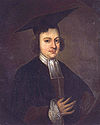Wikipedia:Today's featured article/July 29, 2011
The English poet Christopher Smart was confined to mental asylums from 1757 until 1763. Smart was admitted into St Luke's Hospital for Lunatics on 6 May 1757. While in St Luke's he wrote Jubilate Agno and A Song to David, the poems considered to be his greatest works. Although many of his contemporaries agreed that Smart was "mad", accounts of his condition and its ramifications varied, and some felt that he had been committed unfairly. Smart was diagnosed as "incurable" while at St Luke's, and when they ran out of funds for his care he was moved to Mr Potter's asylum. Smart's isolation led him to abandon the poetic genres of the 18th century that had marked his earlier work, and to write religious poetry. His asylum poetry reveals a desire for "unmediated revelation", and it is possible that the self-evaluation found in his poetry represents an expression of evangelical Christianity. Late 18th-century critics felt that Smart's madness justified them in ignoring his A Song to David, but during the following century Robert Browning and his contemporaries considered his condition to be the source of his genius. It was not until the 20th century that critics reconsidered Smart's case and began to see him as a revolutionary poet. (more...)
Recently featured: Jack L. Warner – Point Park Civic Center – Albert Stanley, 1st Baron Ashfield

